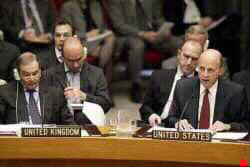The United States has agreed to give up an explicit authorization for military action against Iraq in a new U.N. resolution, opening the door for agreement with France that would end a month-long deadlock in the U.N. Security Council, diplomats reported. Paris, which had led the resistance to earlier U.S. proposals, on Thursday was favorably disposed to the new American draft, which President Jacques Chirac, now on a Middle East trip, still has to review, diplomats said.
Russia, which like France has veto power in the 15-nation Security Council, may try to add some proposals of its own.
The United States had hoped to circulate its new draft resolution, which gives U.N. weapons inspectors a central role, on Friday to key members of the 15-nation council after which hard bargaining is expected on the details.
But it may delay this until early next week in what a U.S. official called "one last shot" in reaching agreement with France following nearly worldwide opposition to the original American proposals.
The new U.S. language also paves the way for a second resolution, as France wanted, to authorize force if weapons inspectors report that Iraq has violated U.N. demands.
But the United States has not committed itself to one and Secretary of State Colin Powell told reporters, after seeing chief U.N. weapons inspector Hans Blix in New York on Thursday, that Washington retained freedom to act as it wished.
"The United States does not need any additional authority even now, if we thought it was necessary to take action to defend ourselves," he said.
"We believe one resolution is appropriate. And obviously the council can always go off and have other discussions any time it chooses," he said.
The new U.S. draft, excerpts of which were obtained by Reuters, came after a flurry of discussions, mainly between Powell and his counterparts in France, Russia and China. British Foreign Secretary Jack Straw, who had endorsed original hard-line American proposals, was key in the mediating, the envoys said.
The Bush administration also appeared willing to drop its earlier insistence that the five permanent council members with veto power -- the United States, Britain, France, Russia and China -- be allowed to join inspectors in Iraq.
And Washington may also relent on its call for troops to accompany the inspectors in the field although some guards may be available to guard headquarters and regional offices of the arms experts, the diplomats said.
Blix has told council members privately that both proposals would jeopardize the independence on his inspection teams.
NEW U.S. PROPOSALS
Specifically, the new U.S. proposals direct the inspectors "to report immediately to the council any failure by Iraq to comply with its disarmament obligations, including its obligations regarding inspections under this resolution."
The council would then meet immediately "to consider the situation and the need for full compliance with all of the relevant Security Council resolutions."
This could mean a second resolution. But if the council does not then authorize force, the United States could decide to strike Iraq anyway, and would probably get considerable support to do so, the envoys said.
In its original draft, the United States had a "trigger" for military action, saying that any U.N. member could "use all necessary means" if it decided Iraq committed a whole series of infractions. The new text also deletes explicit proposals devised last week threatening "consequences."
The U.S. proposals would still include the term "material breach" that the White House could interpret as allowing military action, as NATO did when it struck Yugoslav forces in Kosovo in 1999. But its placement in the text would no longer be linked to military action as in the original draft, the diplomats said.
Nation after nation in an open debate on Iraq on Thursday and Friday told council members to avoid a war and give the U.N inspectors a chance to do their work first.
The arms experts left Baghdad in December 1998 and Iraq, until the recent threats from the Bush administration, had refused to allow them to return.
During the debate, Russian Ambassador Sergei Lavrov referred to a December 1999 resolution that defined what Iraq had to do to get a suspension of sweeping sanctions, imposed when Baghdad's troops invaded Kuwait in 1990.
He said the United States and Britain had promised but never defined which embargoes could be eased, an indication Moscow might want a reference to sanctions in the new text.
Criticizing Washington, he said, "If we are not talking about the deployment of the inspectors but an attempt to use the Security Council to create a legal basis for the use or force or even for a regime change ... then we see no way how the Security Council could give its consent."
PHOTO CAPTION
U.S. Ambassador to the United Nations John Negroponte (R) addresses a Security Council meeting on the situation in Iraq at the U.N. October 17, 2002, as British Ambassador Jeremy Greenstock (L) listens. The United States pledged to introduce shortly a new U.N. resolution, which diplomats said offered compromises that could delay any U.S.-led attack against Iraq. (Ray Stubblebine/Re
- Author:
& News Agencies - Section:
WORLD HEADLINES


 Home
Home Discover Islam
Discover Islam Quran Recitations
Quran Recitations Lectures
Lectures
 Fatwa
Fatwa Articles
Articles Fiqh
Fiqh E-Books
E-Books Boys & Girls
Boys & Girls  Hajj Rulings
Hajj Rulings Hajj Fatwas
Hajj Fatwas














